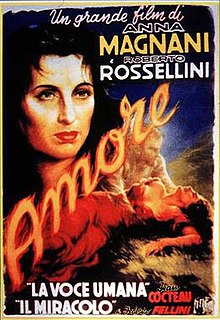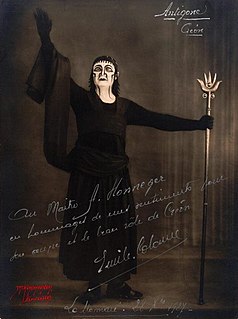Related Research Articles

Jean Maurice Eugène Clément Cocteau was a French poet, playwright, novelist, designer, filmmaker, visual artist and critic. Cocteau is best known for his novels Le Grand Écart (1923), Le Livre Blanc (1928), and Les Enfants Terribles (1929); the stage plays La Voix Humaine (1930), La Machine Infernale (1934), Les Parents terribles (1938), La Machine à écrire (1941), and L'Aigle à deux têtes (1946); and the films The Blood of a Poet (1930), Les Parents Terribles (1948), from his own eponymous piéce, Beauty and the Beast (1946), Orpheus (1949), and Testament of Orpheus (1960), which alongside Blood of a Poet and Orpheus constitute the so-called Orphic Trilogy. He was described as "one of [the] avant-garde's most successful and influential filmmakers" by AllMovie.

In Greek mythology, Silenus was a companion and tutor to the wine god Dionysus. He is typically older than the satyrs of the Dionysian retinue (thiasos), and sometimes considerably older, in which case he may be referred to as a Papposilenus. The plural sileni refers to the mythological figure as a type that is sometimes thought to be differentiated from a satyr by having the attributes of a horse rather than a goat, though usage of the two words is not consistent enough to permit a sharp distinction.
Bacchus is the Roman name for Dionysus, the god of wine and intoxication.

Georges Auric was a French composer, born in Lodève, Hérault. He was considered one of Les Six, a group of artists informally associated with Jean Cocteau and Erik Satie. Before he turned 20 he had orchestrated and written incidental music for several ballets and stage productions. He also had a long and distinguished career as a film composer.

Jean Genet was a French novelist, playwright, poet, essayist, and political activist. Early in his life he was a vagabond and petty criminal, but he later took to writing. His major works include the novels The Thief's Journal and Our Lady of the Flowers, and the plays The Balcony, The Maids and The Screens.

Jean-Alfred Villain-Marais, known professionally as Jean Marais, was a French actor, writer, director and sculptor. He performed in over 100 films and was the muse of acclaimed director Jean Cocteau. In 1996, he was awarded the French Legion of Honor for his contributions to French Cinema.

Raymond Radiguet was a French novelist and poet whose two novels were noted for their explicit themes, and unique style and tone.

Ariadne auf Naxos, Op. 60, is an opera by Richard Strauss with a German libretto by Hugo von Hofmannsthal. Combining slapstick comedy and music, the opera's theme is the competition between high and low art for the public's attention.

Beauty and the Beast is a 1946 French romantic fantasy film directed by French poet and filmmaker Jean Cocteau. Starring Josette Day as Belle and Jean Marais as the Beast, it is an adaptation of the 1757 story Beauty and the Beast, written by Jeanne-Marie Leprince de Beaumont and published as part of a fairy tale anthology.
The Infernal Machine, or La Machine Infernale is a French play by the dramatist Jean Cocteau, based on the ancient Greek myth of Oedipus. The play initially premiered on April 10, 1934 at the Theatre Louis Jouvet in Paris, France, under the direction of Louis Jouvet himself, with costumes and scene design by Christian Bérard. The Infernal Machine, as translated by Albert Bermel, was first played at the Phoenix Theatre, New York, on February 3, 1958, under the direction of Herbert Berghof, with scenery by Ming Cho Lee, costumes by Alvin Colt, and lighting by Tharon Musser.
Les Parents terribles is a 1938 French play written by Jean Cocteau. Despite initial problems with censorship, it was revived on the French stage several times after its original production, and in 1948 a film adaptation directed by Cocteau was released. English-language versions have been produced under various titles including Intimate Relations and Indiscretions.
La Villa Santo Sospir (1952) is a 35-minute amateur or home film directed by Jean Cocteau in which Cocteau takes the viewer on a tour of Francine Weisweiller's villa on the French coast, a major location later used in his film Testament of Orpheus (1960).

The Eagle with Two Heads is a French film directed by Jean Cocteau released in 1948. It was adapted from his own play L'Aigle à deux têtes which was first staged in 1946, and it retained the principal actors from the first Paris production.

Les Parents terribles is a 1948 film adaptation directed by Jean Cocteau from his own stage play Les Parents terribles. Cocteau used the same cast who had appeared in a successful stage revival of the play in Paris in 1946. The film has sometimes been known by the English title The Storm Within.
L'Aigle à deux têtes is a French play in three acts by Jean Cocteau, written in 1943 and first performed in 1946. It is known variously in English as The Eagle with Two Heads, The Eagle Has Two Heads, The Two-Headed Eagle, The Double-Headed Eagle, and Eagle Rampant. The title refers to the double-headed eagle of heraldry. Cocteau also directed a film of his play which appeared in 1948.

L'Amore (Love) is a 1948 Italian anthology film directed by Roberto Rossellini that stars Anna Magnani and Federico Fellini. After an opening dedication to Magnani for her acting ability, it consists of two parts, one titled La voce umana and the other Il miracolo. The second part was banned in the United States, until it was cleared in 1952 by a Supreme Court decision upholding the right to free speech.

Antigone is an opera in three acts by Arthur Honegger to a French libretto by Jean Cocteau based on the tragedy Antigone by Sophocles. Honegger composed the opera between 1924 and 1927. It premiered on 28 December 1927 at the Théâtre Royal de la Monnaie with sets designed by Pablo Picasso and costumes by Coco Chanel.
Francine Weisweiller née Worms was a French socialite and patron of Yves Saint Laurent and Jean Cocteau.
Les Chevaliers de la Table ronde is a play written by French dramatist Jean Cocteau, written in 1937.
References
- ↑ Arthur King Peters: Jean Cocteau and His World. New York: Vendôme Press, 1986, p. 187. ISBN 0-86565-068-3
- ↑ James S. Williams: Jean Cocteau. Reaktion books, 2008.
| This article on a play from the 1950s is a stub. You can help Wikipedia by expanding it. |